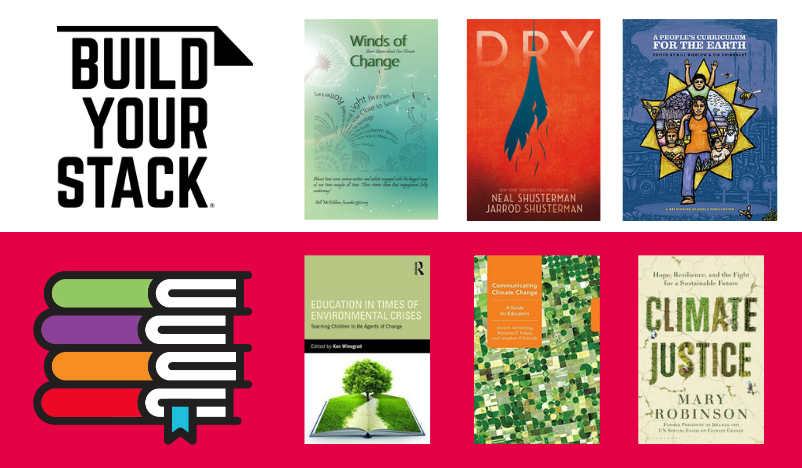This blog post was written by NCTE members Richard Beach and Alan Webb. It’s part of Build Your Stack®, an NCTE initiative focused exclusively on helping teachers build their book knowledge and their classroom libraries. Build Your Stack provides a forum for contributors to share books from their classroom experience; inclusion in a blog post does not imply endorsement or promotion of specific books by NCTE.
Forest fires, terrible storms, floods, rising sea levels—the evidence of climate crisis is before us. Our students will live their lives impacted by the climate emergency.
What we do or fail to do in the next few years to reduce greenhouse gas emissions will make an enormous difference. And in our country and across the world young people are leading the way, encouraging leaders to act before it is too late.
As we explained in the article Climate Change in the Classroom: A Natural Part of English Language Arts, in the American Federation of Teachers magazine American Educator, through literature our students can draw on the power of the imagination to see how society may be impacted, and through writing students can speak out, educate others, and join in the global youth movement.
Our stack includes books for classroom libraries, for whole group reading, and to support English teachers embarking on instruction that they may not be familiar with.
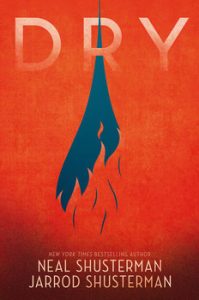 Dry by bestselling children and young adult author Neal Shusterman and his son Jarrod sweeps middle or high school students from the life they know into a climate changed emergency. Drought is perhaps the greatest threat posed by global warming, and the American Southwest is ground zero. The teen characters in Los Angeles quickly realize the importance of water when the taps run dry.
Dry by bestselling children and young adult author Neal Shusterman and his son Jarrod sweeps middle or high school students from the life they know into a climate changed emergency. Drought is perhaps the greatest threat posed by global warming, and the American Southwest is ground zero. The teen characters in Los Angeles quickly realize the importance of water when the taps run dry.
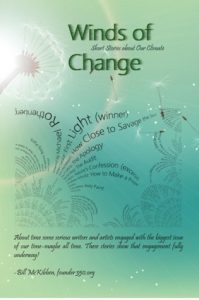 Winds of Change is a “cli-fi” short story and poetry collection of stories that students respond well to. “How Close to the Savage Soul” describes a scary but realistic near future and makes references to often-taught works like Lord of the Flies, Brave New World, and The Tempest. “The Audit” focuses on a middle-class family trying to cut back on their carbon footprint, with different reactions from the teens and the parents.
Winds of Change is a “cli-fi” short story and poetry collection of stories that students respond well to. “How Close to the Savage Soul” describes a scary but realistic near future and makes references to often-taught works like Lord of the Flies, Brave New World, and The Tempest. “The Audit” focuses on a middle-class family trying to cut back on their carbon footprint, with different reactions from the teens and the parents.
An international collection of “cli-fi” short stories, free online, is Everything Change. Allen especially likes “Into the Storm,” “The Grandchild Paradox,” “Acqua Alta,” “LOSD and Fount,” “Standing Still,” “On Darwin Tides,” and “Masks.” (Other cli-fi short story collections and novels).
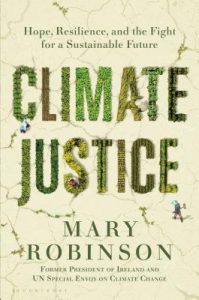 Students will wonder how they can make a difference. Acquaint them with Greta Thunberg, the Fridays for the Future movement, and the book Climate Justice by Mary Robinson—a collection of easy-to-read, compelling stories about everyday people from all parts of the world who have taken action to address climate change in their own communities.
Students will wonder how they can make a difference. Acquaint them with Greta Thunberg, the Fridays for the Future movement, and the book Climate Justice by Mary Robinson—a collection of easy-to-read, compelling stories about everyday people from all parts of the world who have taken action to address climate change in their own communities.
Climate change and environmental degradation raise questions about fairness. Who causes the problem?  Who suffers first and most? How do we find just solutions? A People’s Curriculum for the Earth: Teaching Climate Change and the Environmental Crisis published by the progressive teacher group Rethinking Schools is jam-packed with classroom ready readings and activities: ideas for urban classrooms, role-plays to bring in diverse perspectives, and many short readings addressing issues of environmental justice.
Who suffers first and most? How do we find just solutions? A People’s Curriculum for the Earth: Teaching Climate Change and the Environmental Crisis published by the progressive teacher group Rethinking Schools is jam-packed with classroom ready readings and activities: ideas for urban classrooms, role-plays to bring in diverse perspectives, and many short readings addressing issues of environmental justice.
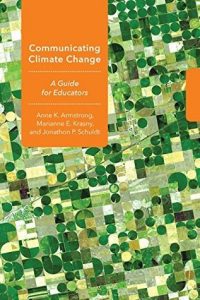 How do we help students address different audiences? Communicating Climate Change: A Guide for Educators (free download) provides examples of teachers working in diverse political and cultural contexts to help students communicate effectively using different framing, metaphors, and messages. A further resource is this free online course on the underlying issues of the language we use to think about and take action on the environment.
How do we help students address different audiences? Communicating Climate Change: A Guide for Educators (free download) provides examples of teachers working in diverse political and cultural contexts to help students communicate effectively using different framing, metaphors, and messages. A further resource is this free online course on the underlying issues of the language we use to think about and take action on the environment.
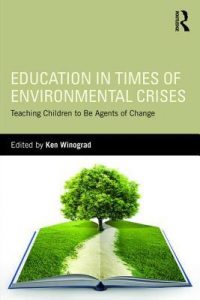 How younger children can become “agents of change” is explored in Education in Times of Environmental Crises—a collection of essays edited by Ken Winograd. Chapters describe specific classroom activities that focus on place-based learning, community activism, environmental ethics, adopting global perspectives, addressing children’s emotions related to resilience, and teachers’ professional development to teach about climate change.
How younger children can become “agents of change” is explored in Education in Times of Environmental Crises—a collection of essays edited by Ken Winograd. Chapters describe specific classroom activities that focus on place-based learning, community activism, environmental ethics, adopting global perspectives, addressing children’s emotions related to resilience, and teachers’ professional development to teach about climate change.
For an appealing visual narrative for elementary students: Bad Future, Better Future: A Climate Change Guide for Kids.
Here are a few more books on teaching about climate change.

 Richard Beach (professor emeritus of English education, University of Minnesota) and Allen Webb (professor of English education at Western Michigan University) are coauthors of Teaching Climate Change to Adolescents: Reading, Writing, and Making a Difference (NCTE/Routledge). They also created a website with extensive resources and the English Teachers Concerned about the Climate Crisis (ETCCC) blog.
Richard Beach (professor emeritus of English education, University of Minnesota) and Allen Webb (professor of English education at Western Michigan University) are coauthors of Teaching Climate Change to Adolescents: Reading, Writing, and Making a Difference (NCTE/Routledge). They also created a website with extensive resources and the English Teachers Concerned about the Climate Crisis (ETCCC) blog.
NCTE and independent bookstores will receive a small commission from purchases made using the links above.
It is the policy of NCTE in all publications, including the Literacy & NCTE blog, to provide a forum for the open discussion of ideas concerning the content and the teaching of English and the language arts. Publicity accorded to any particular point of view does not imply endorsement by the Executive Committee, the Board of Directors, the staff, or the membership at large, except in announcements of policy, where such endorsement is clearly specified.

